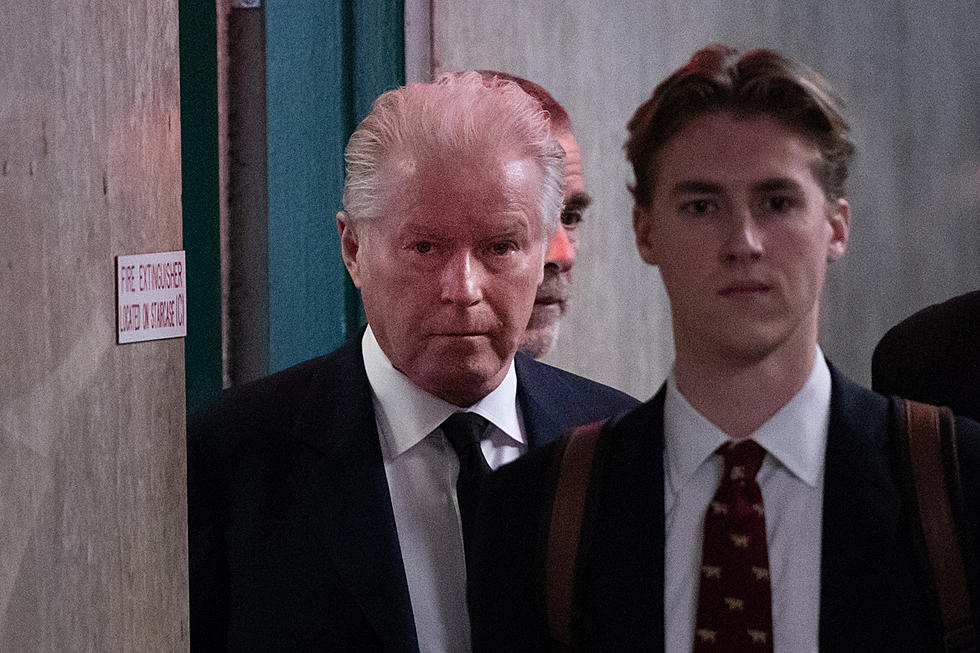
Eagles’ Don Henley Opens Up About Teen Overdose in Lyrics Trial
Don Henley testified on Monday at a Manhattan court in a criminal case involving nearly 100 pages of allegedly stolen Eagles lyrics from the Hotel California album. Some of the most revealing early responses, however, dealt with a teen escort's overdose at his home in 1980.
Rare books collector Glenn Horowitz, former Rock & Roll & Roll Hall of Fame curator Craig Inciardi and rock auctioneer Edward Kosinki have been charged with one count of conspiracy in the fourth degree, which would bring a maximum penalty of four years in prison. Horowitz is charged with first-degree attempted criminal possession of stolen property, as well as two counts of hindering prosecution. Inciardi and Kosinski are also charged with first-degree counts of criminal possession.
The documents in question, handwritten by Henley and valued at more than $1 million, were originally given to a writer named Ed Sanders in the late '70s as part of research for an authorized biography of the band. Longtime Eagles manager Irving Azoff testified on Feb. 21 that Sanders had entered into a contract that permitted him to shop the book to publishers, though the content of the documents still legally belonged to the Eagles. The book was never published, and in 2005, Sanders sold five legal pads of lyrics to Horowitz for $50,000. Horowitz then sold them to Inciardi and Kosinski for $65,000.
Henley became aware of the sales in 2012 after buying several pages of his own lyrics back for $8,500. He then filed a police report for stolen property.
In 2016, Inciardi approached a Christie's auctioneer with 13 pages of lyrics, valued at $700,000, purportedly with the intent to have the auction house manage the sale. But after learning of the papers' questionable sale history, Christie's called off the deal.
In their opening statements, the prosecution argued that the three men knowingly handled the pages as "criminal actors" with the intent to "frustrate Henley's just efforts to recover his stolen property and to forestall legal accountability." The defense is arguing that Sanders has never been charged with a crime and so Horowitz, Inciardi and Kosinski were unaware their purchase was anything other than legal – or that the aforementioned contract existed.
Henley appeared in court on Monday, initially answering basic questions about the history of the Eagles and their formation. Then Assistant District Attorney Aaron Ginandes began asking Henley about a prior criminal conviction involving a teenage sex worker.
"I wanted to escape the depression I was in," Henley said, following the Eagles breakup in 1980, "so I made a mistake." He went on to describe an evening in which he called for a sex worker whom he believed to be of age at the time of their interaction.
Henley said no sexual contact took place, though the pair did cocaine together. After they both fell asleep, Henley testified that he awoke to find the girl having what appeared to be a seizure. He called for medical assistance. They reportedly attended to the girl and found her to be stable, and then allowed her to stay at Henley's residence. Hours later, the police arrived at the house and arrested Henley, the teen escort and another teenage friend who had arrived to give her a ride home.
The escort was 16 years old; her friend was 15. Henley pled guilty to a misdemeanor charge of contributing to the delinquency of a minor, and was sentenced to probation plus a $2,500 fine. "I made a poor decision that I regret to this day," Henley added.
Henley was then asked to describe his writing process with Glenn Frey in the Eagles. He also reviewed an employment contract for the Eagles, which was signed by both Frey and Henley in the mid-'70s. "My understanding was that I owned my own songs," Henley said after reviewing the document in court.
Ginandes then turned to the legal pads at the heart of the case. Henley testified that for many years, he has stored a variety of Eagles-related material at his property he referred to as "The Barn" in Malibu, California. He noted that he has received several requests over the years for his items to be displayed, including the Rock & Roll Hall of Fame. He said he'd loaned some artifacts to them, but not the legal pads with lyrics.
"Those were things that nobody is supposed to see," Henley said, describing the pads as "private and personal." He added that if he was asked to share those pages today, he would not do so.
Henley recounted how he came to know Sanders through Frey, who had met the writer several years prior while he was in Los Angeles conducting research for a book on the Manson family. He testified that it had been Frey's idea for Sanders to write a book on the Eagles, but that he "didn't think it was a great idea" given Sanders' "colorful history."
Henley went on to say that Frey had been told by Sanders that the Manson family was looking for him with the intent to harm him. Frey allowed Sanders to stay at his house, but Henley said Sanders insisted they stay up all night in shifts with a pistol watching for the Mansons. "[I] thought that was a little wild," Henley explained.
But, as Henley testified, "Glenn was the boss, so to speak. ... In my mind, he had the final say. Since the band was in a state of deterioration, I was trying to keep him happy."
The contract between Sanders and the Eagles was reviewed by Henley at the time. Later, when Sanders sent the band roughly 100 pages of his initial manuscript, Henley described being "disappointed" with it, feeling that the material was "cartoonish" and didn't accurately reflect the work ethic of the band. "You know, I was an English major," he said, "so I think I know good writing when I see it."
Given his disappointment, Henley testified that he decided to grant Sanders access to the Barn so that he could review the legal pads himself, but said that he told Sanders not to remove them from the property. "I was desperate to make the book better," he explained, "so I gave him access."
In the decades that followed, Henley testified that he contacted his attorneys each time he discovered that his lyric pages were being sold on auction sites, and he learned that they could be traced back to Sanders. In each case, Henley had a police report filed and sent a letter demanding the pages be returned. Also in each case, Henley was given the opportunity to buy back the pages ($8,500 in 2012, $12,000 in 2014 and $90,000 in 2016).
When asked why he chose only to buy the pages in 2012 and not the other years, he replied that his initial purchase was "a bitter pill to swallow. ... I was buying my own property back." Then in 2014 and 2016, Henley refused the offers. "I'd already been extorted once," he said. "I wasn't going to do it again."
Defense attorney Jonathan Bach then rose to cross-examine Henley, asking if he could recall whether or not he'd given Sanders explicit permission to take the legal pads off the property. "I would have never allowed him to remove them from Los Angeles," Henley said, though he could not recall his exact conversation with Sanders.
"Memory is not a fixed thing," Henley continued. "I can't tell you what I had for breakfast last Friday, but I can tell you [the Eagles] played Wembley Stadium in the summer of '75 opening for Elton John and the Beach Boys."
The defense argued that Henley filed his police reports based on "the confidence of [his] memory," and that he preemptively accused Sanders of theft. Bach then attempted to nail down an exact timeline for when Henley permitted Sanders to access the material and to what extent. A phone call between Henley and Sanders from the summer of 1980 was played out loud for the court, in which Henley mentioned finding "old lyric pads" and Sanders expressing interest in using them for the book. "I've got a lot of that shit," Henley said on the tape.
Bach questioned Henley about a visit Sanders paid to Henley's property in early August 1980, though Henley testified that he did not recall viewing any artifacts with Sanders during that visit. The defense presented multiple pieces of evidence indicating that Henley willingly sent materials to Sanders at his home in Woodstock, New York, including another taped phone call from September 1980 in which Henley stated he would send pads to Sanders, as well as the original label of a shipping box addressed to Sanders that the defense said was a 21 pound box of material.
Henley claimed he had no individual recollection of either approving the shipping of the box or the September phone call. "We're cherry picking these tapes is what we're doing," an exasperated Henley said on the stand. He did, however, concede that the "access" he granted Sanders initially could potentially have included mailing some artifacts to Sanders, which, the defense argued, would mean Sanders didn't steal them from Henley's property.
Other pieces of evidence displayed in court included a copy of Sanders' book manuscript, which contained handwritten edit marks from Henley and reproduced images of lyric pads. They also introduced a letter from Henley to Sanders dated Jan. 12, 1983, in which he wrote: "The book flows very well and is very humorous until the end...still I think the book has merit and should be published." Another letter from June 1, 1984 was signed by Azoff and sent to Sanders, notifying him that he had permission to shop the manuscript to other publishers after originally being rejected, but Henley once again testified that he was under the impression the Eagles still retained the right to veto the publishing of the book if desired, and questioned whether the manuscript shown to him in court was the final version. (Bach also argued that Henley did not mention the contract between Sanders and the band when he spoke with his lawyers about the lyric pages in 2012.)
Henley is expected to return to the witness stand on Tuesday for more cross examination.
This is a developing story.
Eagles Albums Ranked
Gallery Credit: Nick DeRiso
More From WRKI and WINE










